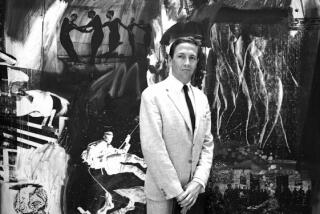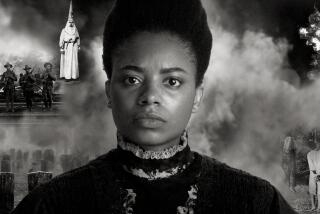Richard Roud, 59; Directed N.Y. Film Festival
- Share via
NEW YORK — Richard Roud, who over the years introduced dozens of foreign films to U.S. audiences through the New York Film Festival, has died in Nimes, France, it was announced here Thursday.
Roud, who lived in Paris, had suffered a heart attack Jan. 15 while vacationing in Nimes and had been in a coma there until his death Monday at age 59.
He was finishing a biography of French director Francois Truffaut and selecting films for a tribute to French cinema scheduled for August at the Film Society of Lincoln Center.
The program now will be dedicated to Roud, said Film Society President Roy Furman.
Roud was the New York Film Festival’s first director, a position he held until his controversial ouster in October, 1987, a maneuver led by Alfred Stern, then the Film Society’s president, and Joanne Koch, its executive director. His firing over policy differences led to several resignations from the festival’s program committee.
He retained the title of director emeritus at the time of his death, and was active in programming of the New Directors-New Films series at the Museum of Modern Art.
The author of several critical studies of cinema, including “A Passion for Films,” a 1983 history of Cinematheque Francaise, Roud won raves as program director for the London Film Festival in the early 1960s.
His success there won him an invitation to organize the first New York Film Festival in 1963.
“Richard was the right man in the right place at the right time,” said writer Susan Sontag, a friend of Roud’s since the 1950s. “He got to know all the innovative New Wave directors and became a spokesperson for a whole new generation of young film makers like Godard and Truffaut and Resnais.
“He was an impresario for these continental film makers, and the films he promoted changed people’s taste in this country.”
Martin Scorsese said Roud influenced the work of a generation of American film makers and helped launch Scorsese’s career by accepting the budding director’s “Mean Streets” for the New York festival in 1973.
“Richard Roud shaped the very look of American movies, because so many film makers saw--and were influenced by--what he chose since 1963,” Scorsese said. “He built up a separate market for art movies around the country, and then distributors picked up the films he chose for the festival.”
Roud also brought to the screen such independent American productions as “Heartland,” “The Times of Harvey Milk” and “Rumblefish.” In 1983 Roud arranged for the showing of Alfred Hitchcock’s “Rear Window.” Released in 1954, the James Stewart-Grace Kelly thriller had been controlled by the Hitchcock estate since the director’s death in 1980.
Roud first began to write about film in the 1950s when he served as London correspondent for motion picture publications.
More to Read
Only good movies
Get the Indie Focus newsletter, Mark Olsen's weekly guide to the world of cinema.
You may occasionally receive promotional content from the Los Angeles Times.









